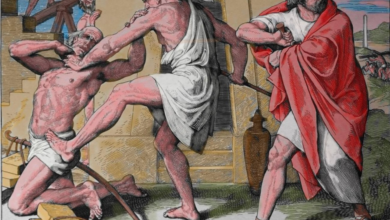Does God Approve the View on Death Penalty Today?

The death penalty has been debated for centuries, with discussions covering moral, legal, and religious perspectives. For Christians, an essential question arises: Does God approve of the death penalty today? To answer this, we must explore biblical teachings, theological insights, academic perspectives, and real-life applications of capital punishment in modern society.
The Biblical Foundation: Old vs. New Testament
The Bible presents different views on the death penalty. Some passages support it, while others emphasize mercy and redemption. The Old Testament contains multiple references to capital punishment, often as a form of justice and deterrence.
Genesis 9:6 – “Whoever sheds the blood of man, by man shall his blood be shed; for God made man in his own image.”
Exodus 21:12 – “Anyone who strikes a man and kills him shall surely be put to death.”
Leviticus 24:17 – “Anyone who takes the life of a human being is to be put to death.”
These laws aimed to uphold order in ancient Israelite society. The principle of “an eye for an eye” (Exodus 21:24) reinforced proportional justice.
New Testament: Mercy and Redemption
In contrast, the New Testament shifts the focus to grace, forgiveness, and redemption.
John 8:3-11 – When a woman caught in adultery was about to be stoned, Jesus said, “Let him who is without sin among you be the first to throw a stone at her.” (John 8:7). This suggests justice must be tempered with mercy.
Romans 12:19 – “Beloved, never avenge yourselves, but leave it to the wrath of God.” Paul reminds believers that ultimate justice belongs to God.
Matthew 5:38-39 – Jesus preaches against retaliation: “You have heard that it was said, ‘An eye for an eye and a tooth for a tooth.’ But I tell you, do not resist an evil person.”
While the New Testament does not reject capital punishment outright, it emphasizes forgiveness and the value of every soul.
Would Jesus Support the Death Penalty Today?
Would Jesus approve of capital punishment in today’s world? His teachings suggest He would prioritize mercy, fairness, and redemption over strict retribution. One major concern is the possibility of executing innocent people. The Innocence Project reports that over 190 individuals in the U.S. have been exonerated from death row due to wrongful convictions.
Consider Cameron Todd Willingham, executed in Texas in 2004 for allegedly setting a fire that killed his three daughters. Later investigations suggested the fire was accidental, casting doubt on his guilt. Would Jesus, who preached justice and mercy, support a system prone to such irreversible errors?

Christian Views on the Death Penalty Today
Christian perspectives on capital punishment vary. R.C. Sproul, a Reformed theologian, stated that while the Bible permits the death penalty, it should be applied cautiously and fairly. The Catholic Church now opposes it outright. In 2018, Pope Francis declared the death penalty “inadmissible” because it violates human dignity.
Many evangelical Christians still support it, believing it upholds justice. Several scholars and theologians have explored the death penalty from a Christian perspective: Christopher Marshall, in Beyond Retribution, argues for restorative over punitive justice.
David W. Opderbeck (Seton Hall University) argues that justice should balance retribution and rehabilitation (Theological Perspectives on Criminal Law, 2010). Again, Miroslav Volf, in Exclusion and Embrace, stresses the need for forgiveness and reconciliation.
Jeffrie G. Murphy, in Retribution, Justice, and Therapy, critiques modern use of capital punishment, questioning whether it aligns with Christian ethics. The question of whether God approves of the death penalty today is complex.
If society can protect itself without executions, would Jesus favor life imprisonment instead?
If capital punishment can be applied fairly and without error, does it align with God’s justice?
Conclusion
The death penalty is more than a legal issue—it is a moral one that requires Christians to reflect on justice and mercy. The Old Testament lays a foundation for capital punishment, but the New Testament shifts the focus to grace and forgiveness.
As we examine flaws and biases in the justice system, we must ask: Does capital punishment reflect God’s justice, or does it undermine His call for mercy? Regardless of where you stand, the most important question is: How can we best reflect Christ’s love and righteousness in the way we administer justice today?




